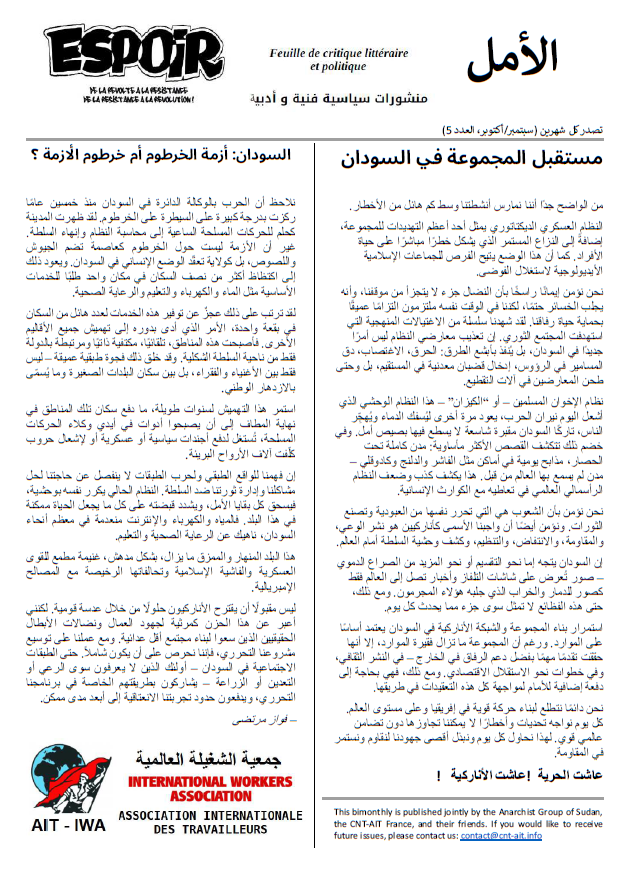We notice that the proxy war ongoing in Sudan for the past 50 years has largely focused on controlling Khartoum. The city has appeared as a dream for armed movements seeking to hold the regime accountable and bring an end to power. However, the crisis is not about Khartoum as a capital housing armies and looters, but rather as a state that complicates the humanitarian situation in Sudan. This is due to more than half the population crowding into one place to access basic services such as water, electricity, education, and healthcare.
The result has been the inability to provide these services to such a large population in one spot, which in turn led to the marginalization of all other regions. These areas, by default, became self-reliant and connected to the state only in terms of formal authority. This created a deep class divide—not just between rich and poor, but between residents of small towns and the so-called national prosperity.
This marginalization continued for many years, eventually pushing the populations of those regions to become pawns in the hands of armed movement proxies, used to advance political or military agendas or to ignite wars that cost thousands of innocent lives.
Our understanding of class realities and class war is inseparable from the need to solve our problems and manage our revolution against authority. The current regime continues to repeat itself with brutality, crushing every remaining fragment of hope, and tightening its grip on everything that could make life possible in this country. Basic services such as water, electricity, and internet are unavailable in most parts of Sudan, not to mention healthcare and education.
This collapsed and fragmented country remains, astonishingly, a coveted prize for military, Islamist-fascist powers and their cheap allegiance to imperialist interests.
It is not acceptable for anarchists to propose solutions through a nationalist lens. However, I express this sorrow as an elegy for the efforts of workers and the struggles of real heroes who sought to build a less hostile society. As we work to expand our liberation project, we strive for it to be inclusive. Even the social classes in Sudan—those who know nothing beyond herding, mining, or agriculture—are, in their own way, engaged in our liberation program, pushing the boundaries of our emancipatory experiment as far as possible.
Sudan – A War to Dismantle into Mini-States
After it became clear to the people that the goal of this war is to divide Sudan into mini-states—just as happened with South Sudan and North Sudan—in order to seize its resources, it also became apparent that its aim is to destroy the Sudanese people themselves, making them more accepting of new forms of domination and deals over gold, agricultural land, Nile waters, oil, antiquities, livestock, and other squandered wealth that ends up in the pockets of mafias.
This is a land of materialism and fragmentation: thousands of militias control specific areas, enforcing different laws and constitutions. The terrorist state has also become significantly weakened, as reflected in its attempts to seek international aid and in its division of Khartoum’s reconstruction among foreign powers—airports to Saudi Arabia, major projects to Egypt, and so on.
While the state has directed all its energy toward crushing what remains of the people, diseases and epidemics ravage citizens in Khartoum. The state is unable to even combat mosquitoes; dengue fever spreads, killing thousands of Sudanese every day. The staggering death toll is an indicator of a sharp population decline—migration, wars, and diseases have conspired to wipe out this region.
The continuation of war in Sudan no longer means its survival. It is only a matter of time before the country is broken apart into two states and loses half its population in the newly born entity. This conflict is directly tied to foreign imperialist powers and their policies of dismantling the region—and here we are, witnessing their plans bear fruit.– Fawaz Murtada
This article is taken from the newsletter (Al Amal) / Hope #5
Content :
- Sudan: The Khartoum Crisis or the Crisis of Khartoum?, Sudan – A War to Dismantle into Mini-States (https://cnt-ait.info/2025/10/27/khartoum-crisis/)
- URGENT: GENOCIDE IN SUDAN / EL FASHER HAS FALLEN INTO THE HANDS OF THE BLOODTHIRSTY JANJAWEED MILITIA (https://cnt-ait.info/2025/10/27/al-fasher-en)
- The Future of the Sudan Anarchist Gathering (https://cnt-ait.info/2025/10/30/future-sag)
- TUNISIA: GABES WANTS TO LIVE! (https://cnt-ait.info/2025/10/30/gabes-en)
- MOROCCO: LONG LIVE THE STRUGGLE OF YOUTH AND THE POPULATION AGAINST CORRUPTION AND ARBITRARIZATION AND FOR HEALTH, EDUCATION, AND FREEDOM! (https://cnt-ait.info/2025/10/30/morocco)
Previous issues :
الأمل (Al Amal) / Hope #1 https://cnt-ait.info/2025/02/09/hope-al-amal-1-2025
الأمل (Al Amal) / Hope #2 https://cnt-ait.info/2025/04/15/al-amal-2
الأمل (Al Amal) / Hope #3-4 https://cnt-ait.info/2025/07/13/al-amal-3-4-en

4 commentaires sur Sudan: The Khartoum Crisis or the Crisis of Khartoum? Sudan – A War to Dismantle into Mini-States